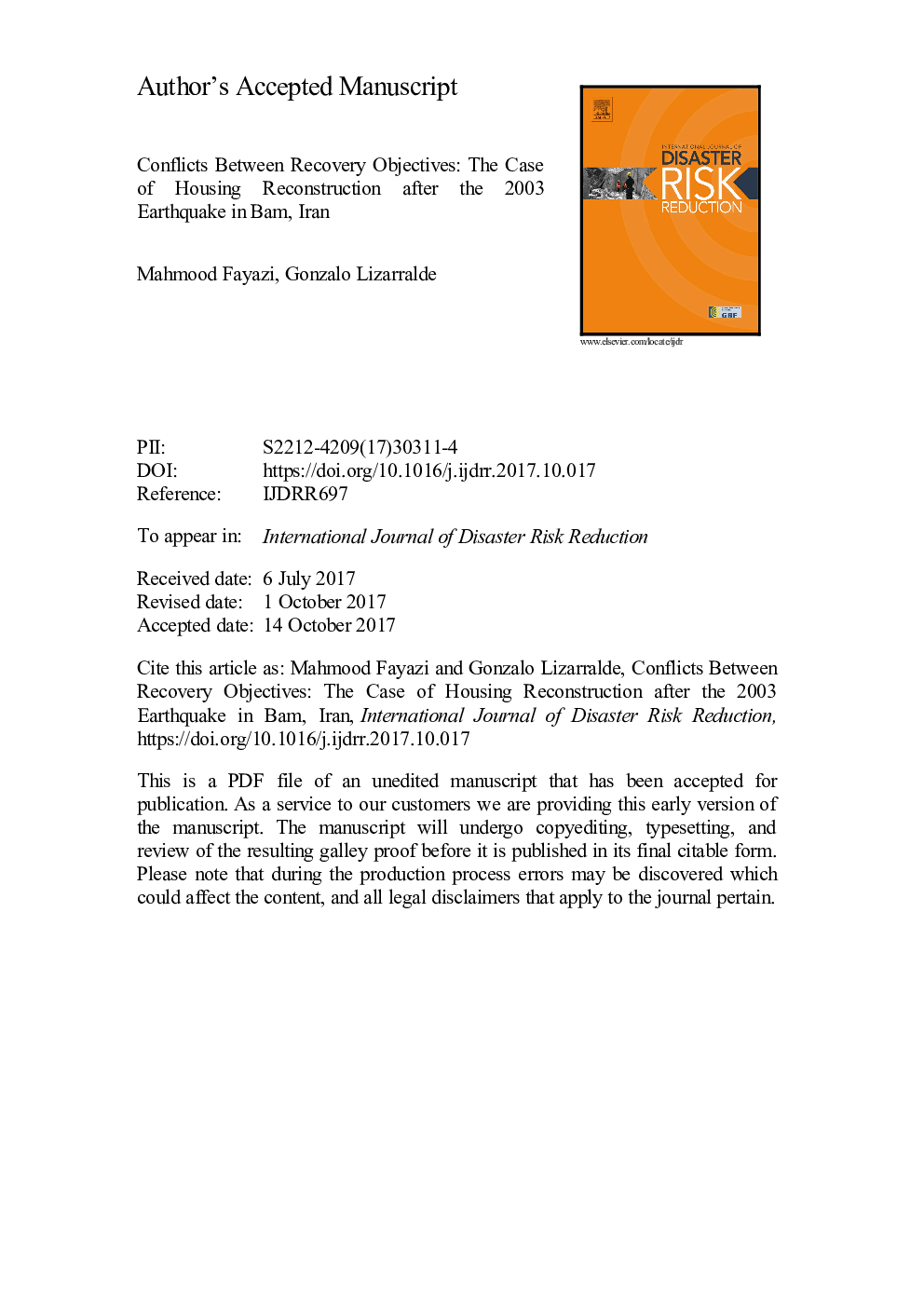| کد مقاله | کد نشریه | سال انتشار | مقاله انگلیسی | نسخه تمام متن |
|---|---|---|---|---|
| 7471967 | 1485143 | 2018 | 34 صفحه PDF | دانلود رایگان |
عنوان انگلیسی مقاله ISI
Conflicts between recovery objectives: The case of housing reconstruction after the 2003 earthquake in Bam, Iran
ترجمه فارسی عنوان
تعارض بین اهداف بهبود: مورد بازسازی مسکن پس از زلزله سال 2003 در بام ایران
دانلود مقاله + سفارش ترجمه
دانلود مقاله ISI انگلیسی
رایگان برای ایرانیان
کلمات کلیدی
بازسازی مسکن، بهبود، اهداف متضاد، مشارکت عمومی، بم، ایران،
ترجمه چکیده
مطالعات مدیریت بحران نشان داده است که برنامه های بازسازی مسکن اغلب دارای اهداف متضاد هستند. با این حال، دانش کافی در مورد چگونگی ظهور و تشدید درگیری های بین اهداف در طول روند بازسازی هنوز وجود دارد. هدف این مقاله توضیح علل و پیامدهای این درگیری ها است و نشان می دهد که چگونه برنامه های بازیابی می توانند از آنها جلوگیری کنند. پس از توسعه چارچوب تحلیلی عوامل پایه و تشدید اهداف متضاد، این پرسشنامه کیفی، بررسی برنامه بازسازی مسکن پس از زلزله سال 2003 در بام را بررسی می کند. نتایج تجربی نشان می دهد سه مجموعه از درگیری های بین اهداف محیطی اقتصادی، اجتماعی، فرهنگی و ساخته شده و نشان می دهد که چگونه آنها را به تکرار واحدهای مسکونی مدولار ساده، که تا حدودی نابود منظره معماری غنی و تاریخی، نادیده گرفتن نیازهای خانوار، هویت، فرهنگ، و سنت ها و آسیب ناپذیری شهرت بم را به وجود می آورد. نتایج نشان می دهد اختلافات حل نشده در زمینه پس از فاجعه بازسازی و عدم تصمیم گیری مشارکتی قبل از بلایای طبیعی به عنوان عوامل اصلی از اهداف متضاد. از سوی دیگر، درگیری بین سهامداران و همچنین چالش های فرایند مشارکت در روند بازسازی، مناقشات بین اهداف بهبود را تشدید می کند. یافته ها توصیه می کنند از ایجاد سریع سازمان های جدید در مرحله پس از حادثه جلوگیری و تعادل بین دانش حرفه ای و دانش محروم را برای رسیدن به اهداف کوتاه مدت و بهبودی درازمدت پیشگیری می کنند.
موضوعات مرتبط
مهندسی و علوم پایه
علوم زمین و سیارات
فیزیک زمین (ژئو فیزیک)
چکیده انگلیسی
Disaster management studies have demonstrated that housing reconstruction programs often contain conflicting objectives. Yet, insufficient knowledge still exists about how conflicts between objectives appear and escalate during the reconstruction process. The purpose of this article is to explain the causes and consequences of these conflicts and to reveal how recovery programs can prevent them. After developing the analytical framework of underlying and intensifying factors of conflicting objectives, this qualitative inquiry examines the housing reconstruction program conducted after the 2003 earthquake in Bam. Empirical results show three sets of conflicts between economic, social, cultural, and built environment objectives, and reveal how they led to repeating simple modular housing units, which partially destroyed a rich and historic architectural landscape, ignoring households' needs, identities, culture, and traditions and damaging irreversibly Bam's unique urban fabric. Results reveal unsolved controversies in the post-disaster reconstruction field and the lack of participatory decision-making before disasters as the underlying factors of such conflicting objectives. On the other hand, conflicts between stakeholders as well as challenges in participation processes during the reconstruction process intensified conflicts between recovery objectives. Findings recommend preventing the rapid establishment of new organizations in the post-disaster stage and finding a balance between professionals' and lay community's knowledge to fulfill short and long-term recovery objectives.
ناشر
Database: Elsevier - ScienceDirect (ساینس دایرکت)
Journal: International Journal of Disaster Risk Reduction - Volume 27, March 2018, Pages 317-328
Journal: International Journal of Disaster Risk Reduction - Volume 27, March 2018, Pages 317-328
نویسندگان
Mahmood Fayazi, Gonzalo Lizarralde,
